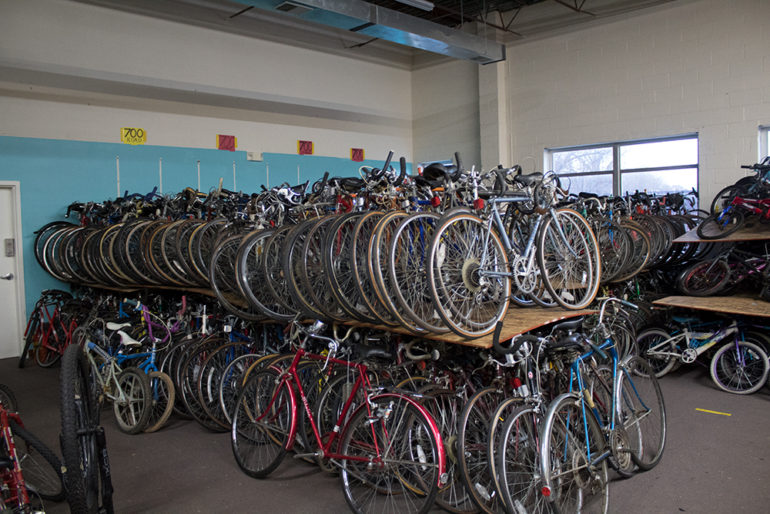ROCKVILLE, Maryland — Step into the Bikes for the World’s Rockville, Maryland, warehouse, and enter a cyclist’s dream: thousands of bikes in all different shapes, sizes and colors splayed across the floor and even hanging along the ceiling.
But the bikes aren’t for sale.
Instead, the charity provides used bikes and spare parts to developing countries across Africa, Asia and South America.
“There are so many ways this can benefit the world,” Executive Director Keith Oberg told the University of Maryland’s Capital News Service. “Americans can get rid of their clutter and change a life in Africa or somewhere else.”
The nonprofit, which Oberg founded in January 2005, seeks donated bikes to repair and salvage before shipping them to disenfranchised communities internationally. The organization cooperates with various international programs that are embedded in the local communities to distribute the bikes and provide training for fixing and riding them.
After delivering 5,000 bikes in their first year, the organization now averages between 12,000 and 13,000 each year, Oberg said.
Village Bicycle Project, one of the international partners, delivers bikes to Ghana and Sierra Leone. This program works with local organizers, whom they have vetted, to gauge needs in each village, Executive Director Joshua Poppel said.
Those on-the-ground workers can discuss what each village needs in terms of whole bicycles or simply parts. Each village has unique needs and requests, but mountain bicycles are by far the most popular due to rocky terrain in Africa and Latin America, said Oberg.
The project also has specialized training to teach local residents. The one-day workshops educate locals, particularly women, on how to ride and fix the bikes.
Young women in Africa are particularly susceptible to losing education and work opportunities due to cultural norms, so these programs, among others, aim to get these women bikes, Oberg and Poppel said.
Bikes for the World has delivered 131,303 bicycles, according to the organization’s website. They are funded through donations, partnerships and the sale of unique bikes unsuitable for rocky terrain. Bicycle motocross, or BMX, used to be popular in Rockville, for example, so there are an abundance of rare BMX bike frames in the area that can generate revenue for the organization, Oberg said.
The organization has several main goals, which include providing affordable transportation, access to education, creating jobs and economic opportunities, and promoting sustainable practices.
While many Americans and Europeans take bicycles for granted, the vehicle can change lives in impoverished communities, Oberg and Poppel agreed.
“Instead of walking 10 miles to school, a student can quickly go on a bike,” Oberg said. “A carpenter can transport his tools or a farmer can transport his produce.”
Bikes for the World collects bikes through individual donations and community group collections.
Michael Esten, who donated two bikes on Nov. 30, said he couldn’t ride a bike after having hip surgery, and felt better donating the two bikes for a good cause than leaving them to rust. It’s common for people to donate bikes after injuries, or after children move away from home, Oberg said.
Faith groups and service projects are often huge sources of bicycles, Oberg said.
After receiving donations, volunteers check whether the bikes are in good condition, or should be stripped for parts.
“We aren’t just sending American trash over there,” Poppel said. “We want to send good quality vehicles that can actually make a difference.”
Volunteers range from ninth-grade students to retired teachers, and they all agree that the work is challenging but rewarding when you think about how it can help poverty-stricken communities.
“It started with a love for bikes and also a love for recycling and sustainability,” said Mark Winn-Ritzenberg, a former teacher at Alice Deal Middle School in Washington, D.C. “Now it’s a hobby with this international impact on top.”
Once all the bikes, parts and accessories have been prepared, the nonprofit fills up a 40-foot shipping container and fills in the voids among bikes with spare parts to maximize their shipment. They do two shipments of between 450 and 550 bicycles from Baltimore Harbor each month, Oberg said.
The most recent shipment, headed to Sierra Leone, left from the Port of Baltimore on Dec. 11, according to Oberg.
Oberg had high hopes after starting the nonprofit over a decade ago, and the success that Bikes for the World has had transforming lives overseas still amazes him.
“We deliver many more bicycles than when I started this,” Oberg said. “These bikes can, and hopefully do, change lives of African and Latin American children.”
More information about Bikes for the World is available here: http://www.bikesfortheworld.org/

